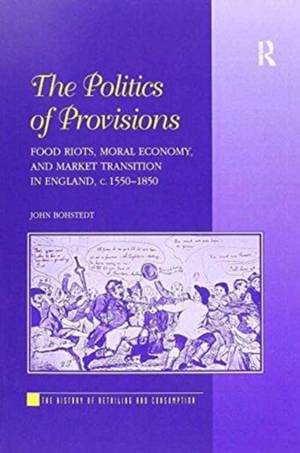
- Afhalen na 1 uur in een winkel met voorraad
- Gratis thuislevering in België vanaf € 30
- Ruim aanbod met 7 miljoen producten
- Afhalen na 1 uur in een winkel met voorraad
- Gratis thuislevering in België vanaf € 30
- Ruim aanbod met 7 miljoen producten
Zoeken
The Politics of Provisions
Food Riots, Moral Economy, and Market Transition in England, c. 1550-1850
John Bohstedt
€ 112,95
+ 225 punten
Uitvoering
Omschrijving
The 'politics of provisions' - forceful negotiations over sustenance - has created surprising contests in world history, particularly in times of market transition. In England a 'politics of provisions' evolved in a dialogue between popular riots and paternalist subsistence policies from Tudor dearths to the Victorian embrace of free-market doctrines. Hence provision politics was a core ingredient of both state-formation and of the emergence of the first market economy and society in England. This book is the first full-scale critical revision of E.P. Thompson's seminal model of the 'moral economy of the crowd', which has had huge influence across the social sciences. It is the first synthesis of the many dispersed studies of three centuries of marketing and negotiations by riot over subsistence. By explaining such long-term shifts in patterns of political negotiation from parish-pump to Privy Council, this study offers a new view of why food riots were a more compelling and lasting bone of contention than enclosures, wages or votes.
Specificaties
Betrokkenen
- Auteur(s):
- Uitgeverij:
Inhoud
- Aantal bladzijden:
- 324
- Taal:
- Engels
- Reeks:
Eigenschappen
- Productcode (EAN):
- 9781138257696
- Verschijningsdatum:
- 11/11/2016
- Uitvoering:
- Paperback
- Formaat:
- Trade paperback (VS)
- Afmetingen:
- 156 mm x 234 mm
- Gewicht:
- 458 g

Alleen bij Standaard Boekhandel
+ 225 punten op je klantenkaart van Standaard Boekhandel
Beoordelingen
We publiceren alleen reviews die voldoen aan de voorwaarden voor reviews. Bekijk onze voorwaarden voor reviews.








